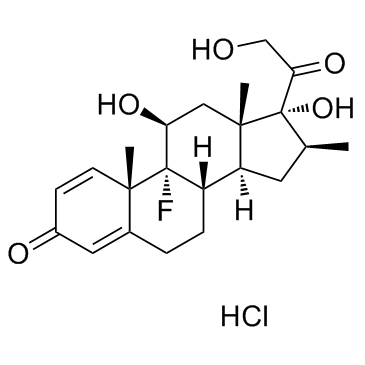| Description |
Betamethasone (hydrochloride) is a glucocorticoid steroid with anti-inflammatory and immunosuppressive properties.Target: Glucocorticoid ReceptorBetamethasone (hydrochloride) is the hydrochloride of betamethasone, which is a potent glucocorticoid steroid with anti-inflammatory and immunosuppressive properties. Unlike other drugs with these effects, betamethasone does not cause water retention. The median (range) IC50 value for betamethasone butyrate propionate evaluated in the streptococcal pyrogenic enterotoxin A-stimulated peripheral-blood mononuclear cells was 291.6 (0.001-1171.5) ng/ml, which was significantly higher than the value 0.072 (0.01-222.5) ng/ml found in concanavalin A-stimulated peripheral-blood mononuclear cells (P=0.0245) [1]. Children exposed prenatally to betamethasone (n = 121) did not differ in systolic or diastolic blood pressure from children exposed to placebo (n = 102) (mean difference: systolic: -1.6 mm Hg; 95% confidence interval: -4.1 to 0.8 mm Hg; diastolic: -0.3 mm Hg; 95% confidence interval: -2.5 to 1.8 mm Hg) [2]. Intra-articular corticosteroid injection of 6 mg of betamethasone acetate/betamethasone sodium phosphate at the knee joint was not significantly associated with SAI at the time points tested [3].Clinical indications: Dermatitis; Discoid lupus erythematosus; Eczema; Lichen; Prurigo; PsoriasisToxicity: Symptoms of overdose include burning, itching, irritation, dryness, folliculitis, hypertrichosis, acneiform eruptions, hypopigmentation, perioral dermatitis, allergic contact dermatitis, maceration of the skin, secondary infection, skin atrophy, striae, and miliaria.
|
